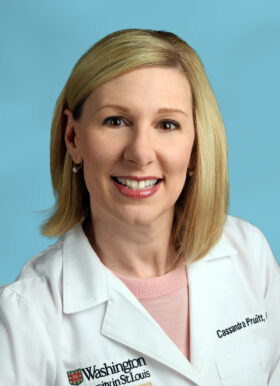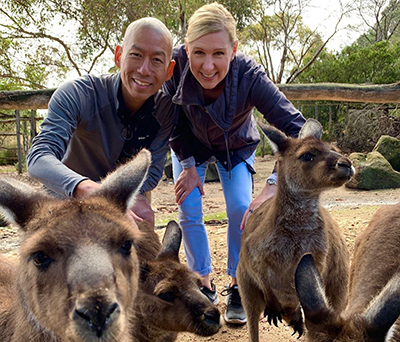Cassandra Pruitt, MD

Cassandra Pruitt, MD, is a Washington University primary care pediatrician who specializes in the care of children who are medically complex, providing a medical home for her patients from birth to adolescence.
Please call 314-454-6300 for an appointment.
What happened in the course of schooling to influence you to choose your specialty?
Like many physicians, I had an idea what I might be interested in when I started medical school, but when I completed my 3rd year, it became clear I was suited for pediatrics as a specialty. It simply felt like it was the right field for me.
I’m a general pediatrician and my current clinical focus is children with medical complexity.
Who are the patients you see and what do you do for them?
I am the primary care provider for children who are medically complex. That term is very broad and there is no one definition for that group of children but generally this term is used for children who require the assistance of multiple subspecialists to manage their care or have dependence on medical technology to support their health.
These children may require a g-tube (gastrostomy feeding tube) or they may have tracheostomy with ventilator dependence. The children I see also rely on other healthcare agencies and specialties, including therapists and other non-physician support to help manage their everyday lives.
I provide a primary care home for these patients who have the majority of their specialty care through Washington University and St. Louis Children’s Hospital. Our office helps to coordinate their care and manage all of their appointments, if desired. We also help with completing the large amount of “paperwork” required for their care. The amount of paperwork that has to be completed for these children with medical complexities is enormous and complicated. It is very different from children who are seen just once a year for a check-up.
We don’t necessarily prescribe all of their medications because some of their medications are subspecialty specific. But we will refill medications if needed. There are definitely some areas we leave to the subspecialists.
We are a five-day-a-week enterprise and have an after- hours exchange — just like any other primary care practice. We want to be the family’s central stop for care and we will reach out to the subspecialists as needed. If a family chooses to work directly with the subspecialist, that’s okay too.
For instance, we may tell a family they need to call pulmonology, because they manage your ventilator and this might be a question they would prefer to answer.
The idea behind our primary care model is that we are able to answer many of the family’s more straightforward concerns. Because we see a large number of children with medical complexity, we are more comfortable with the common complications that happen with certain types of technology, and certain types of diseases.

Is your practice unique in St. Louis?
We are the only primary care model In St. Louis focused on the care of children with medical complexities throughout their childhood.
However, we operate just like any other pediatric primary care office. Once you are a patient in our office, you are a patient until you are at least age 21 years old. We are your one-stop for well-child care, sick child visits and everything in-between.
We also provide primary care for the siblings of our patients. We do offer primary care to patients in our community who do not have any other way to access a primary care physician, for whatever reason. But our main focus is children with medical complexity.
Which aspect of your practice do you find most interesting?
Every day is interesting. I am still on a learning journey to care for children with medical complexity because of the variety of diseases and different types of care required. But as I work with the subspecialists, I learn something new every day.
I’ve also developed an interest in the business side and ways we could improve payment systems to better serve that population.
What new developments in your field are you most excited about?
It is exciting that caring for children with medical complexity has become a focus at many large medical centers. A handful of complex care clinics and programs have been in place for years across the country, but now I am seeing these programs open up in almost every city that has pediatric subspecialty care or a Children’s Hospital. The support I’ve received from the leadership at Washington University to develop the Complex Care Clinic here has been outstanding and was much needed.
However, I would say the most exciting development happened in 2019 when the Advancing Care for Exceptional Kids (ACE Kids) Act was signed into law. Hopefully it will provide federal funds to expand access for children who have medical complexity.
My hope is that we see development of standardized care for these kids and improved collaboration across the country. When you start this type of program, it grows.
Do you see patients from all over the state?
I do. However, I don’t encourage parents to utilize our services if they already have a primary care physician in their community who is doing a good job of managing their care – especially if they live more than an hour away.
Thanks to telehealth, many visits can be done over the phone – this has been a big help to those families who live far away.
What brought you to Washington University?
My husband and I were recruited in 2009 from the University of Texas Medical Branch in Galveston.
My husband is a pediatric hematologist oncologist and we had been interested in moving. When they reached out, it became a combination recruitment. I initially joined the division of hospital medicine because there was no existing opportunity to be a primary care physician within the department of pediatrics at Washington University.
What particular accomplishment is most gratifying to you?
The fact that I have been able to establish an outpatient primary care practice for complex patients within St. Louis Children’s Hospital is probably my most gratifying accomplishment. I had been practicing primary care in an academic setting as a general academic pediatrician for eight years when I arrived at Washington University. I made a career change to do hospital medicine and had always been trying to find my way back to outpatient primary care.
What was the hardest thing you’ve ever done?
While starting the complex care clinic was the most rewarding thing I’ve ever done, it was not the hardest thing I’ve ever done. That would be my transition to a pediatric hospitalist when we first moved here.
It was a huge change coming from another health care system where I knew all the physicians and how to get things done. When we moved here, I had to start fresh. It was a completely different discipline. All of a sudden, I am in the emergency room or in the delivery room – resuscitating babies. I was practicing a completely different type of medicine than I had been for the previous eight years. It was an enormous challenge.
Where are you from?
I’m originally from Tallahassee, Florida. My parents still live there. I have since moved around a lot – went to college in Georgia and did all my medical training in Texas. We were living in Texas until we moved to St. Louis.
What is the best advice you’ve received?
The best advice was from one of my mentors, and I’ve been fortunate to have a lot of wonderful, supportive mentors throughout my career. He told me to never let perfection get in the way of progress.
I’ve used this advice over and over again. He pushed me to understand that you can be frozen in your tracks if you are waiting for something to be absolutely perfect before you release it. Depending on how much of a perfectionist you are, it may have been perfect three versions ago. I have a pretty high bar. I probably do hold onto things longer than they need to be before I release them. I have had to learn that it’s “okay to be okay” with the fact that there might always be room for improvement.
This is true, especially in regards to the complex care clinic. There are just so many pieces that couldn’t have been known — until you start. We are learning along the way.
If you weren’t a doctor, what would you like to be doing?
About 10 years ago I would have said I wanted be a teacher. Now my answer is I would be working for a not-for-profit children’s agency of some kind — involved in helping families get the assistance they need for their children. I’ve become a lot more interested in the non-medical needs of children who have medical complexity and children who are in underserved populations.
As you get deeper into your career, you have time to notice those pieces, as opposed to just practicing medicine. You realize the need is so much more than just what happens in your office.
We have the ability to impact the lives of children with medical complexity — and their parents — in so many ways. As a pediatrician, it’s the most rewarding thing I have done.